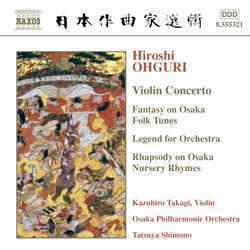| All Artists: Hiroshi Ohguri, Tatsuya Shimono, Osaka Philharmonic Orchestra Title: Ohguri: Violin Concerto; Fantasy on Osaka Folk Tunes Members Wishing: 0 Total Copies: 0 Label: Naxos Original Release Date: 1/1/2000 Re-Release Date: 5/20/2003 Genre: Classical Styles: Chamber Music, Forms & Genres, Concertos, Historical Periods, Classical (c.1770-1830) Number of Discs: 1 SwapaCD Credits: 1 UPC: 747313532124 |
Search - Hiroshi Ohguri, Tatsuya Shimono, Osaka Philharmonic Orchestra :: Ohguri: Violin Concerto; Fantasy on Osaka Folk Tunes
 | Hiroshi Ohguri, Tatsuya Shimono, Osaka Philharmonic Orchestra Ohguri: Violin Concerto; Fantasy on Osaka Folk Tunes Genre: Classical
|
Larger Image |
CD Details |
CD ReviewsAnother unknown Japanese composer J Scott Morrison | Middlebury VT, USA | 06/22/2003 (4 out of 5 stars) "Naxos is bringing us, slowly, classical music by Japanese composers. Recently I was struck by a disc of music by Akio Yashiro (1929-1976). In this CD we have music by his slighter older compatriot, Hiroshi Ohguri (sometimes transliterated as Oguri) (1918-1982). He was in the first generation of Japanese composers writing Western-style music. Much has been written about the influence of Asian music on Western classical music, all the way back to the stereotyped use of pentatonic scales in 'The Mikado' to the burst of interest by composers like Debussy and Ravel after an Asian Exposition in Paris in 1888 on up to modern composers like Lou Harrison and Olivier Messaien. But little has been written in the West about the influence Western music had on Asian composers. Of course I am speaking here of Asian composers using Western orchestral instruments. A few symphony orchestras were founded there early in the century but native composers didn't really get a start until much later. Ohguri himself started out as a horn player in the Japan Philharmonic (now the NHK Symphony) but soon moved to the Osaka Philharmonic, the orchestra heard on this disc, and was a lifelong friend of its revered conductor, Takashi Asahina (1908-2001), surely the conductor with the record for the longest tenure at one orchestra, more than fifty years. Ohguri, trained entirely in Japan, had complete mastery of Western compositional techniques, and indeed the earliest (and longest) piece on this CD, the Violin Concerto, sounds as if it could have been written, except for some use of various pentatonic scales, by, say, an Eastern European composer. Indeed, it is somewhat faceless, a sort of Bartók-and-water composition that is more than competent but with little individuality. It is, however, played brilliantly by violinist Kazuhiro Takagi and the Osaka Philharmonic conducted by Tatsuya Shimono. And lest there be any doubt, the Osaka band is a world-class orchestra.It is in the other pieces recorded here, all of them later than the 1963 Concerto, that Ohguri's personality emerges. Perhaps it's because of my own unavoidable Western cultural bias, but I'm much charmed by the Japanese touches in 'The Fantasy on Osaka Folk Tunes,' 'Legend for Orchestra,' and 'Rhapsody on Osaka Nursery Rhymes.' Of course I am not familiar with the source material for these pieces, but there is plenty here that is identifiably Japanese - the large-interval appoggiaturas and slow tremolos, the bending of notes as is done on native string and wind instruments, modified pentatonic scales [and they are not all the simple CDFGA that we can all identify], elements of exuberant taiko drumming - mixed with more usual Western effects. There is rhythmic vitality abounding, and indeed in several spots in 'Legend' one would swear Ohguri was paying homage to the rhythms in, say, 'West Side Story.' It strikes me that the 13-minute 'Rhapsody' particularly is a successful mélange of Western - even American - and Japanese materials. Just listen to the opening fanfare - it could have come straight out of, say, a Max Steiner movie score - followed immediately by a charming tune, presumably one of the Osaka nursery rhymes. One has no sense of the one grafted onto the other; rather, they are integrated into a pleasing whole. I would urge this disc on anyone who is even the least bit interested in hearing music from Asia. I have a strong suspicion - without knowing for sure - that there is an as-yet-undiscovered treasure trove of similar music and one hopes that Naxos will continue bringing examples to us here in the West. Review by Scott Morrison"
|

 Track Listings (6) - Disc #1
Track Listings (6) - Disc #1